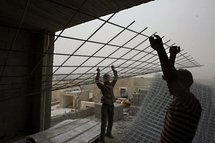Israel to continue Jerusalem settlements despite peace talks
Patrick Moser
JERUSALEM, Patrick Moser- Newly launched, US-brokered peace efforts hit a snag on Monday as Israel vowed settlement building would continue in east Jerusalem, infuriating the Palestinians who protested to Washington.
"It is evident we will continue to build over the next two years in Gilo, Pisgat Zeev, French Hill," Information Minister Yuli Edelstein told public radio in reference to Jewish settlements in annexed Arab east Jerusalem.

Palestinian labourers work on a construction site in the east Jerusalem settlement of Ramat Shlomo.
"The American administration must respond to those Israeli acts," Abbas told AFP, one day after the announcement that Israel and the Palestinians had started indirect talks initially scheduled to get under way in March.
His top negotiator Saeb Erakat said the Palestinian Authority "officially protested to the American administration."
"We told the American administration we consider this act as a great provocation," he said in reference to the construction in Ras al Amud.
The US State Department said on Sunday both sides were taking measures "conducive to successful talks," and that Israel had explained there would be no construction at east Jerusalem's Ramat Shlomo settlement for two years.
Edelstein admitted a controversial plan to build 1,600 new homes in the east Jerusalem settlement would not start for another two years, but stressed this followed normal planning procedures.
Underscoring the deep mistrust between Israel and the Palestinians, State Department spokesman Philip Crowley cautioned both sides they would be held accountable if they did anything to "seriously undermine trust."
Israel stressed in a statement that building and planning in Jerusalem will continue as usual, "exactly as has been the case for the past 43 years" and insisted it had not undertaken to freeze the Ramat Shlomo project.
The Islamist Hamas movement urged Abbas to reverse the decision to take part in the "absurd negotiations."
"The Zionist decision to build new homes in the middle of Jerusalem... shows that the return to negotiations is a free service rendered to the occupation and its settlement projects," the Palestinian faction said.
Jerusalem Mayor Nir Barkat insisted the municipality "continues to promote planning and construction throughout the city for all its residents -- Jews, Christians and Muslims."
"We trust that the prime minister will not allow a freeze in Jerusalem, not in words and not in actions," he said.
Right-wing parties accused Netanyahu of betraying his electorate.
Jerusalem and Jewish settlements are among the thorniest issues in efforts to achieve a peace deal.
Israel, which captured east Jerusalem in 1967 and later annexed it, considers the Holy City its "eternal and indivisible" capital, while the Palestinians see east Jerusalem as the capital of their promised state.
The so-called proximity talks were originally due to start in March but the Palestinians withdrew after Israel publicised the Ramat Shlomo building plan.
The Palestinians eventually agreed to hold the talks after receiving US assurances the Jerusalem settlement expansion plan would be frozen.
The two sides had held just over a year of direct negotiations, after a seven-year hiatus, but those collapsed in December 2008 with little to show.
EU foreign affairs chief Catherine Ashton on Monday hailed the relaunch of the peace process.
"I am delighted the proximity talks appear to be moving," she said in Brussels and pledged her full backing for US special Middle East envoy George Mitchell. "We will do everything we can to support him."
EU foreign ministers welcomed the launch of the talks, stressing that they "should lead as soon as possible to the resumption of direct bilateral negotiations." Their declaration did not mention the early snag.
An Israeli settlement watchdog group warned the increase in Jewish settlement activity in east Jerusalem is likely to torpedo any chance of finding a two-state solution under which a Palestinian state would be created alongside Israel.
"The intensification of settlement activities in east Jerusalem threatens the chances of implementing the two-state solution and might create an irreversible situation that would prevent a compromise in Jerusalem," Peace Now said.
-----------------------------------------------------------------------------